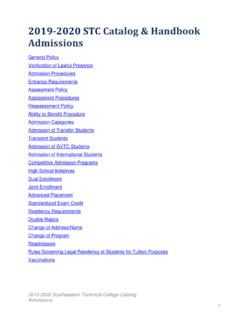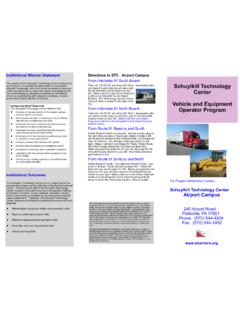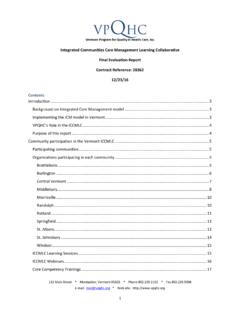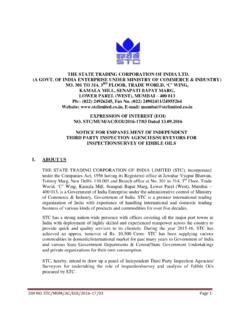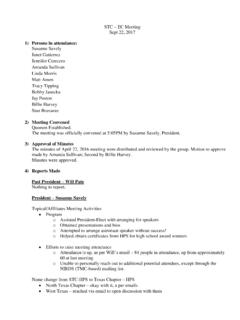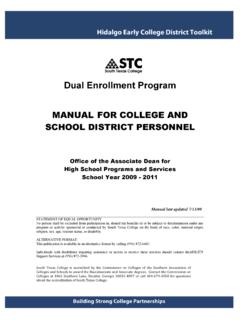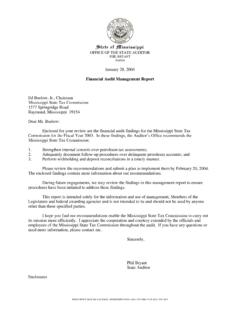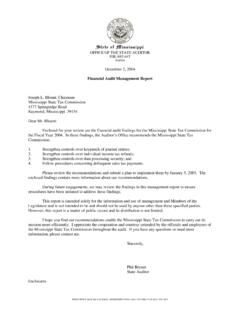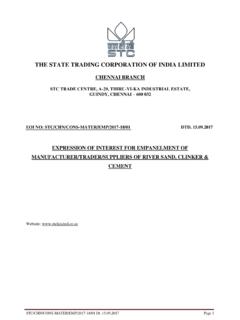Transcription of Stay the Course TM Replication Program
1 1 Request for Proposals (RFP) for Stay the Course TM Replication Program Date of Release: March 9, 2018 Responses Due: April 16, 2018 by 12 CST 2 Table of Contents I. Nature of Request .. 3 II. agency Background .. 3 III. Statement of Work .. 3 A. Program Description .. 3 B. Staffing .. 6 C. Quality Assurance .. 6 D. Training and Technical Assistance .. 7 E. Intellectual Property .. 7 IV. Data Management and Sharing .. 8 A. Data Management Requirements for Stay the CourseTM Replication Sites .. 8 B. Data Sharing Requirements for Stay the CourseTM Replication Sites and Community Colleges .. 8 V. Financial Information .. 12 VI. Instructions to Bidders .. 14 A. Questions about the RFP .. 14 B. Proposal Submission Information .. 14 C. Calendar of Events .. 15 D. Response Package .. 15 E. Evaluation Criteria .. 16 VII. Terms and Conditions.
2 16 A. Award .. 16 B. Term .. 17 VIII. Attachments .. 17 Attachment A RFP Response Form .. 17 Attachment B Subrecipient Project Budget .. 17 Attachment C Internal Control Structure Questionnaire .. 17 3 I. Nature of Request Catholic Charities, Diocese of Fort Worth, Inc. (hereinafter referred to as CCFW) is accepting proposals from social service organizations to replicate their proven intervention, Stay the CourseTM, as outlined below in this Request for Proposals (RFP). The commitment is for four (4) years with a minimum 10% annual financial match from the replicating social service organization. II. agency Background CCFW is a mission-driven, non-profit, faith-based social service agency with a mission to serve, advocate, and convene, all in the spirit of addressing poverty, that seeks to: CREATE solutions that move people out of poverty and are able to be replicated and scaled; ERADICATE poverty families experience by serving them to earn a living wage, have ample savings, have no harmful debt, and be free of government assistance; and TRANSFORM the way our industry and nation is solving for this age-old problem of poverty.
3 Towards this end, CCFW currently provides a diverse range of services, including more than 30 programs that address the needs of over 80,000 individuals and families annually. Among the many services offered by CCFW, case management is the core. CCFW provides comprehensive services that promote cultural adjustment, self-sufficiency, and citizenship among refugees. CCFW offers many other services that promote financial stability, prevent or end homelessness, restore relationships, improve health disparities, provide housing, and address immediate basic needs such as medical care for the uninsured and rental assistance for families facing eviction. All of these services play a role in CCFW s zealous goal to end poverty in our 28-county service area. III. Statement of Work A. Program Description CCFW is looking for a 501(c)(3) social service organization to replicate their proven intervention, Stay the CourseTM.
4 Stay the CourseTM is a community college Program administered by CCFW and researched by the University of Notre Dame s Wilson Sheehan Lab for Economics Opportunities (LEO) via a randomized controlled trial (RCT). Given the college completion crisis occurring in our nation, CCFW and LEO have a commitment to eradicating poverty by increasing the educational attainment for low-income students in our country. There are four cited reasons why students are not persisting in college (including the cost of college, limited academic preparation, institutional obstacles, and personal 4 obstacles). Our theory of change is that institutional and personal obstacles can be overcome through intensive case management leading to persistence and graduation. In 2013, CCFW and LEO launched Stay the CourseTM in Tarrant County, Texas, in partnership with Tarrant County College (TCC).
5 Since that time, over 389 students have gone through the Program . The core intervention of Stay the CourseTM is support from a navigator who works hand-in-hand with students to ensure college persistence and completion. The navigator provides intensive case management to the student, helping eliminate barriers, making connections to necessary resources (such as transportation, jobs, childcare, and basic needs assistance), and coaching to ensure that a student believes that they can achieve academic success. The navigator meets face to face with the student every other week and has weekly reciprocal contact with the student through email, phone calls, and/or text messages. The student and navigator work together to develop a service plan with SMART goals (Specific, Measurable, Action-Oriented, Realistic, and Timely). Students work to make progress on their action steps that lead to their SMART goals every 21 days.
6 The navigator and student work hand-in-hand to ensure progression towards those action steps and goals. Students enrolled in Stay the CourseTM also have access to emergency financial assistance. This assistance is available for non-academic barriers that the student is facing that would prevent the student from persisting in school, and eventually graduating. Each student has access to $1,500 of financial assistance for the duration of the Program with a maximum of $500 in any given semester. Emergency financial assistance cannot be used for tuition or books, but rather is used for non-academic financial issues that would impact a student s ability to persist. Importantly, LEO has concluded that after 3 years, Stay the CourseTM participants are twice as likely to remain enrolled than the comparison group and are also more likely to graduate. Due to the significant findings of LEO s study, CCFW has expanded Stay the CourseTM to multiple TCC campuses, developed a Replication package and now seeks Replication sites.
7 Replication Site/Social Service Provider The Replication site will serve as the implementer of Stay the CourseTM. Replication sites will be responsible for: Managing a successful and collaborative relationship with their local community college; Enrolling a minimum of 120 students into Stay the CourseTM services in Fall 2018 and Spring 2019; Providing case management and emergency financial assistance services with fidelity to the model as described in the Stay the CourseTM manual; participating in training and technical assistance, data sharing, and continuous quality improvement efforts; Raising the funding required to implement Stay the CourseTM as detailed in Section V. Replication sites will be provided with technical assistance and support, an online manual, and reporting guidelines and requirements from CCFW that would aid in their success to replicate Stay the CourseTM.
8 The role of a Replication site would be to implement this evidence-based Program in accordance with the current Program design. 5 Community College In selecting a partner community college, the Replication agency will ensure the following is in place in order for the Stay the CourseTM Program to be a good fit: Support from the system president; Support from the campus president(s); A Pell-Eligible and Full-time student population greater than 4,700; A commitment to market and advertise to students to engage in Stay the CourseTM; A preferred commitment of private, permanent office space for 3 onsite Stay the CourseTM navigators. At minimum private office space for navigators and student meetings; A commitment of a data sharing agreement with LEO to gain access of appropriate data to: o Identify a population of eligible students; o Have access of a large enough pool of students to randomize students into a control and treatment group without interfering with research integrity; and o Have access of student s records related to persistence, completion and transfers; and o Have access to and report to the National Student Clearinghouse CCFW CCFW is the originator of Stay the CourseTM and will serve as the central organization coordinating the elements of the replicated network.
9 CCFW will support the implementation of Stay the CourseTM at Replication sites with quality and fidelity to the model. CCFW will be responsible for compiling and distributing key information for implementing the Stay the CourseTM intervention, providing training and technical assistance to Replication sites, and monitoring quality assurance of Stay the CourseTM at each Replication site to assess for excellence and consistency and support Program improvement in alignment with the model. CCFW will also commit to funding a portion of costs at the Replication site as detailed in Section V. LEO LEO will conduct an impact evaluation of Stay the CourseTM at each Replication site. Impact evaluations assess the overall outcomes of a project, focus on finite goals rather than inputs, and involve a careful comparison to understand what would have happened in the absence of the intervention.
10 The results of impact evaluations can be used to inform decisions about whether to expand, replicate, or scale the intervention. LEO will conduct the impact evaluation in the form of a randomized controlled trial (RCT). RCT s involve randomly assigning students who express interest in Stay the CourseTM into either a treatment condition that receives Stay the CourseTM services or a control condition that receives services typically offered by the community college. LEO will commit to funding costs related to University of Notre Dame staff and benefits, travel, and final dissemination of the research work. 6 To learn more about CCFW, please visit To learn more about LEO, please visit For more information on Stay the CourseTM success, please visit B. Staffing Staffing for Stay the CourseTM is critical to its success and staffing is handled in full by the nonprofit provider.
